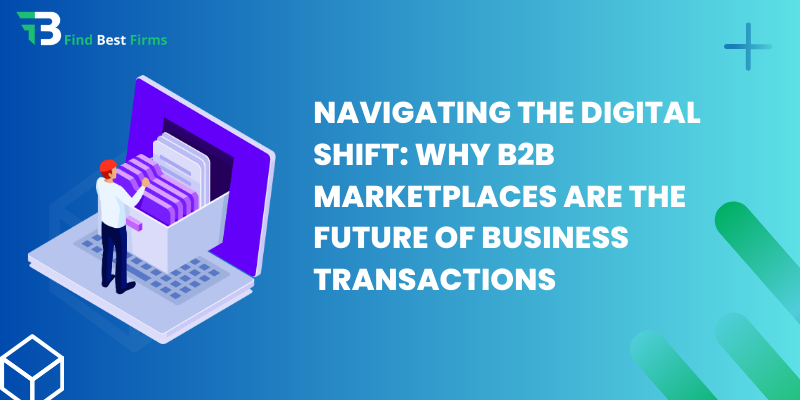The digital age has redefined the way businesses operate and connect, especially in the B2B (business-to-business) landscape. Traditional methods of conducting business, like cold-calling or in-person meetings, are rapidly being replaced by online platforms that streamline transactions. Among these, B2B marketplaces have emerged as a powerful tool that promises to shape the future of business interactions.
With B2B e-commerce sales projected to surpass $20 trillion by 2027, businesses can no longer afford to ignore the growing influence of online marketplaces. In this blog, we’ll delve into the reasons why B2B marketplaces are becoming the future of business transactions and explore how companies can harness their potential.
What Are B2B Marketplaces?
B2B marketplaces are digital platforms that connect businesses, allowing them to buy and sell goods and services directly. These platforms function as intermediaries between suppliers and buyers, providing tools for negotiation, payment, and even logistics.
Unlike B2C (business-to-consumer) platforms like Amazon or eBay, some of the Top B2B marketplaces focus on high-volume sales and longer-term relationships between companies. Some of the most popular B2B marketplaces include Alibaba, Amazon Business, and ThomasNet. These platforms cater to a variety of industries, offering everything from raw materials to finished products, and even services like software solutions and consulting.
Why B2B Marketplaces Are the Future
1. Increased Efficiency in Business Transactions
Efficiency is a key driver behind the adoption of B2B marketplaces. Traditionally, business transactions involved a complex and often time-consuming process of sourcing suppliers, negotiating contracts, and managing multiple touchpoints. B2B marketplaces simplify this by centralizing these tasks on a single platform.
Suppliers can showcase their offerings, while buyers can compare products, negotiate deals, and make purchases, all within a matter of clicks. This streamlined process significantly reduces the time and cost involved in sourcing materials or services, allowing businesses to operate more efficiently.
2. Global Reach and Scalability
One of the most attractive features of B2B marketplaces is their ability to connect businesses across the globe. In the past, expanding into new markets often required significant investments in local offices, sales teams, and logistics. However, with B2B marketplaces, companies can instantly tap into global supply chains without the need for physical presence in new markets.
For example, a manufacturer in the United States can source components from a supplier in China with ease, thanks to platforms like Alibaba or Global Sources. This global reach not only helps businesses scale but also fosters competition, leading to better pricing and service levels for buyers.
3. Data-Driven Decision Making
In today’s digital world, data is gold. B2B marketplaces provide businesses with invaluable insights into market trends, buyer behavior, and pricing strategies. By leveraging this data, companies can make more informed decisions about their supply chains, pricing, and product offerings.
Additionally, many B2B marketplaces offer advanced analytics tools that help businesses track their performance, identify growth opportunities, and optimize their operations. This data-driven approach empowers businesses to stay ahead of the competition and capitalize on emerging trends.
4. Reduced Barriers to Entry
Historically, entering a new market or industry required substantial resources and networks. B2B marketplaces have drastically lowered these barriers, allowing even small businesses to compete on a global scale.
Startups and small businesses can now reach buyers or suppliers that would have been inaccessible without these platforms. This democratization of business transactions has leveled the playing field, enabling smaller players to grow and thrive in competitive industries.
5. Improved Transparency and Trust
One of the biggest challenges in B2B transactions is trust. Buyers and suppliers often face issues related to product quality, payment terms, and delivery timelines. B2B marketplaces address these concerns by implementing robust review systems, payment gateways, and escrow services that ensure transparency and security in every transaction.
Buyers can leave feedback on suppliers, while suppliers can verify the credibility of buyers. This mutual vetting process fosters trust between parties and ensures that transactions are conducted in a secure and transparent manner.
6. Cost Efficiency and Competitive Pricing
B2B marketplaces allow businesses to cut down on intermediary costs, such as agents and distributors. By eliminating the middleman, companies can find best vendors and negotiate directly with them, which often leads to more competitive pricing.
In addition, the competitive nature of marketplaces forces suppliers to offer better terms to attract buyers. This benefits businesses by reducing procurement costs and improving profit margins.
7. Sustainability and Eco-Friendly Practices
As sustainability becomes a growing priority for businesses, B2B marketplaces are helping companies adopt more eco-friendly practices. Many platforms now offer features that allow buyers to source products from environmentally responsible suppliers, track the carbon footprint of their purchases, and choose suppliers who prioritize sustainable practices.
By using these platforms, businesses can not only improve their bottom line but also meet their sustainability goals, which is increasingly important in today’s market.

